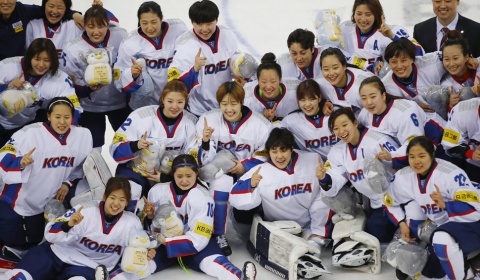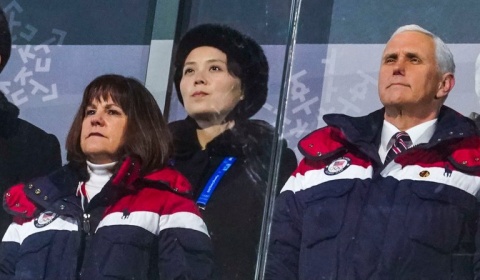
XXIII Olympic Winter Games
The Games featured 102 events in fifteen sports, with the addition of “big air” snowboarding, mass start speed skating, mixed doubles curling, and mixed team alpine skiing to the Winter Olympic programme. 2,914 athletes from 92 NOCs competed, including the debuts of Ecuador, Eritrea, Kosovo, Malaysia, Nigeria and Singapore.
After a state-sponsored doping program was exposed following the 2014 Winter Olympics, the Russian Olympic Committee was suspended, and selected athletes were allowed to compete neutrally under the IOC designation of “Olympic Athletes from Russia“.
Olympic Athlete from Russia (OAR) is the International Olympic Committee’s designation of select Russian athletes permitted to participate in the 2018 Winter Olympics in Pyeongchang, South Korea. The designation is the result of the suspension of the Russian Olympic Committee after the Olympic doping controversy. During the 2018 Winter Olympics, two athletes from this team were tested positive for banned substances, and found guilty of doping by the Court of Arbitration for Sportand sanctioned by the IOC. One bronze medal was returned.

This is the first team since the Unified Team of 1992 to have Russian athletes participating under the neutral Olympic flag.
Despite tense relations, North Korea agreed to participate in the Games, enter with South Korea during the opening ceremony as a unified Korea, and field a unified team in women’s ice hockey.

Kim Jong Un’s sister is at the Olympics…

Feb 9, 2018 – U.S. Vice President Mike Pence sat in close proximity to Kim Yo Jong, the sister of North Korean leader Kim Jong Un

Feb 9, 2018 – After arriving in South Korea with a high-level delegation, the sister of North Korean leaderKim Jong Un publicly shook hands with the neighboring nation’s president during tonight’s opening ceremony of the 2018 Winter Olympics.
Chloe Kim: US teenager makes history at Winter Olympics
Norway led the total medal tally with 39, followed by Germany’s 31 and Canada’s 29. Germany and Norway were tied for the most gold medals won; both won fourteen golds. Host nation South Korea won seventeen medals, their highest medal haul at a Winter Olympics.
| Rank | NOC | Gold | Silver | Bronze | Total |
|---|---|---|---|---|---|
| 1 | 14 | 14 | 11 | 39 | |
| 2 | 14 | 10 | 7 | 31 | |
| 3 | 11 | 8 | 10 | 29 | |
| 4 | 9 | 8 | 6 | 23 | |
| 5 | 8 | 6 | 6 | 20 | |
| 6 | 7 | 6 | 1 | 14 | |
| 7 | 5 | 8 | 4 | 17 | |
| 8 | 5 | 6 | 4 | 15 | |
| 9 | 5 | 4 | 6 | 15 | |
| 10 | 5 | 3 | 6 | 14 | |
| 11 | 4 | 5 | 4 | 13 | |
| 12 | 3 | 2 | 5 | 10 | |
| 13 | 2 | 6 | 9 | 17 | |
| 14 | 2 | 2 | 3 | 7 | |
| 15 | 2 | 1 | 0 | 3 | |
| 16 | 1 | 6 | 2 | 9 | |
| 17 | 1 | 2 | 0 | 3 | |
| 18 | 1 | 1 | 4 | 6 | |
| 19 | 1 | 0 | 4 | 5 | |
| 20 | 1 | 0 | 1 | 2 | |
| 21 | 1 | 0 | 0 | 1 | |
| 1 | 0 | 0 | 1 | ||
| 23 | 0 | 2 | 1 | 3 | |
| 24 | 0 | 1 | 1 | 2 | |
| 25 | 0 | 1 | 0 | 1 | |
| 26 | 0 | 0 | 2 | 2 | |
| 0 | 0 | 2 | 2 | ||
| 28 | 0 | 0 | 1 | 1 | |
| 0 | 0 | 1 | 1 | ||
| 0 | 0 | 1 | 1 | ||
| Total (30 NOCs) | 103 | 102 | 102 | 307 | |
Changes in medal standings
| Ruling date | Sport/Event | NOC | Total | Comment | ||||
|---|---|---|---|---|---|---|---|---|
| List of official changes in medal standings (during the Games) | ||||||||
| 22 February 2018 | Curling Mixed doubles | −1 | −1 | On 18 February 2018, it was reported that Russian curler Alexander Krushelnitskiy failed a doping test for meldonium. After the testing of the B sample, the Court of Arbitration for Sport confirmed that they were instituting the formal proceedings. On 22 February 2018, Krushelnitskiy and his partner Anastasia Bryzgalova were stripped of their bronze medals in the mixed doubles. The bronze medals were then awarded to the Norwegian mixed curling team, who had lost the bronze medal game to Krushelnitskiy and Bryzgalova. | ||||
World and Olympic records set at the 2018 Winter Olympics
Records
- Noriaki Kasai of Japan became the first athlete in history to participate in eight Winter Olympics when he took part in the ski jumping qualification the day before the opening of the Games. The previous record of seven Winter Olympics was held by Russian luger Albert Demchenko.
- American Nathan Chen became the first figure skater to land five quadruple jumps in one program.
- German figure skaters Aliona Savchenko and Bruno Massot set a new ISU best free skating score of 159.31 in pair skating.
- Canadian figure skaters Tessa Virtue and Scott Moir set a new ISU best short dance score of 83.67 and a new ISU best combined total score of 206.07[60] in ice dance. French ice dancers Gabriella Papadakis and Guillaume Cizeron set a new ISU best free dance score of 123.35.
- Russian figure skater Alina Zagitova set a new ISU best short program score of 82.92 in Ladies’ single skating.
- Dutch speed skater Sven Kramer won gold in the men’s 5000m event, becoming the only male speed skater to win the same Olympic event three times. He was also the first man to win a total of eight Olympic medals in speed skating.[63]
- Dutch speed skater Ireen Wüst won an individual gold medal for the fourth Olympics in a row, the first time this had been achieved by a Winter Olympian. She also became the first speed skater (male or female) to win ten Winter Olympic medals and the first female Winter Olympian to win nine individual medals.
- Chinese short track speed skater Wu Dajing beat the men’s 500m world record twice en route to winning a gold medal, becoming only the second person in history to skate the discipline in under 40 seconds (after American J. R. Celski), and the first to achieve this at “sea level”.
- Dutch athlete Jorien ter Mors became the first female athlete to win Olympic medals in two different sports at a single Winter Games;[66] she won a speed skating gold medal in the 1000 meters and she was also part of the Dutch short track team that won bronze in the 3000 metre relay.
- Ester Ledecká of the Czech Republic won gold in the skiing super-G event and another gold in the snowboarding parallel giant slalom, making her the first female athlete to win Olympic gold medals in two different sports at a single Winter Games.
- Norwegian cross-country skier Marit Bjørgen won bronze in the women’s team sprint and gold in the 30 kilometre classical event, bringing her total Olympic medal haul to fifteen, the most won by any athlete (male or female) in Winter Olympics history. The record was previously held by fellow Norwegian athlete Ole Einar Bjørndalen who has thirteen Olympic medals.
- Germany and Canada tied for gold in the two-man bobsleigh event, only the second time in history that two countries had tied for a gold medal in this particular event, the first time being in the 1998 Winter Olympics twenty years earlier.
- Norway won a total of 39 medals, setting a new record for the highest number of medals won at a single Winter Olympics. Their 39th medal was the gold won by cross-country skier Marit Bjørgen in the 30km classical event. The record was previously held by the USA who won 37 medals in Vancouver in 2010.